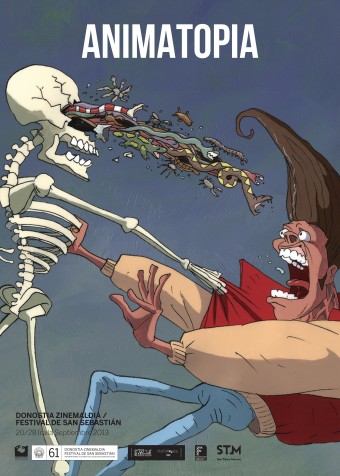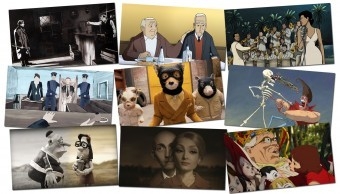The 61st San Sebastian Festival, to take place from 20-28 September 2013, will present the retrospective: ANIMATOPIA. NEW PATHS OF ANIMATION CINEMA, an overview of international productions made in the genre over the last decade.
ANIMATOPIA is the place cohabited by highly suggestive and original contributions brought to us by contemporary animation cinema. The retrospective takes us on a tour of movies that go far beyond family entertainment, fantastic adventures and the limits wrongly pinned on the genre. The programmed titles will highlight the freedom and capacity of animation to tackle any subject from myriad angles and points of view. Matters often considered taboo in the field of animated cartoons (sex, violence) and varied slants on all kinds of social concerns, historical traumas and red-hot issues will abound. There will also be subjective takes on reality, philosophical reflections, hybridisation with documentary film, personal memories, interventions by plastic artists and the confessions of moviemakers who firmly believe that the truth of human experience is not exclusive to photographic film but can also be expressed through drawing. Reaching, too, beyond the traditional animated movies and 3D infographics, the cycle will congregate films that experiment with and combine all sorts of techniques and procedures: stop motion, rotoscoping, cut-out animation, alternative forms of digital animation, etc.
Penned for participation in the cycle along with other titles that will be added to the programme as they are confirmed in the coming months, are: Waking Life (Richard Linklater, 2001), My Life As McDull (Toe Yuen, 2001), Hair High (Bill Plympton, 2004), Mind Game (Masaki Yuasa, 2004), The District (Aron Gauder, 2004), Paprika (Satoshi Kon, 2006), Princess (Anders Moregenthaler, 2006), Tachigui: Life of the Amazing Fastfood Grifters (Mamoru Oshii, 2006), De profundis (Miguelanxo Prado, 2007), Waltz with Bashir (Ari Folman, 2008), Mary and Max (Adam Elliot, 2009), Metropia (Tarik Saleh, 2009), Fantastic Mr. Fox (Wes Anderson, 2009), Chico & Rita (Fernando Trueba, 2010), Crulic (Anca Damian, 2011), Alois Nebel (Tomás Lunák, 2011), Tatsumi (Eric Khoo, 2011), Arrugas (Ignacio Ferreras, 2011), Gordo, calvo y bajito (Carlos Osuna, 2011) and A Liar’s Autobiography (Bill Jones, 2012).
The retrospective, jointly organised with San Telmo Museum, Euskadiko Filmategia/Filmoteca Vasca and Filmoteca Valenciana, will come with a book coordinated by Roberto Cueto.
Thematic retrospective
Under more generic, allegorically-entitled headings, the Festival has grouped together films not commonly offered (even in specialised sections) and which, nevertheless, deserve filmgoersí attention. Based on this philosophy, a number of cycles have seen the light, including "The Guys in the Photo", "Forgotten Films"; "You Only Live Once", "The Best 100 Years in our Lives", "The European Adventure", "Spanish Cinema Discoveries", "The Red Nightmare", "A Long Absence", the two editions dedicated to post-war Italian comedy, entitled "Hunger, Humour and Fantasy" and "The Boom Italian-Style", or "The TV Generation", "It Happened yesterday", "50 from the 50s", "Amongst friends and neighbours", "Incorrect@s", "Rebellious and untamed", "Emigrants", "Cold Fever", "Japanese Film Noir", "Backswash; curring edge of french cinema", ".doc – New paths of non-fiction", "American Way of Death: American film noir 1990-2010", "Digital Shadows: Last genration chinese film", "Very Funny Things. New American Comedy" and "In Progress. Ten years with latin american cinema" last of these cycles.







